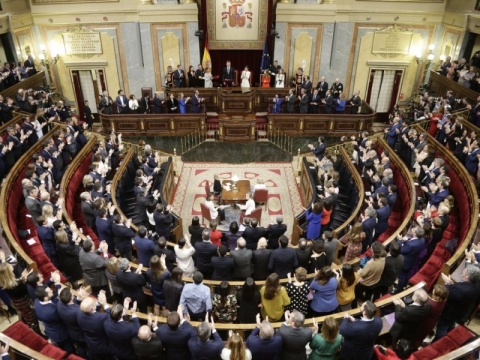Politics
Sánchez will submit to the investiture session for a second term on Wednesday
After the agreement with the Catalans
USPA NEWS -
This coming Wednesday, November 15, the acting President of the Spanish Government, the socialist Pedro Sánchez, will submit to the investiture session in Parliament for a second term. It will do so after reaching agreements with the Republicans and the Catalan independentists, and with the independentists and the Basque nationalist right. In the case of the two Catalan parties, the agreement, which will be registered in Parliament on the same Wednesday, provides for a broad amnesty for all those convicted for the declaration of independence of Catalonia in 2017.
The agreement on the future Amnesty Law was announced last week and has irritated center-right and far-right parties. After the announcement by the Socialist Party of the agreement with Catalans and Basques to give their vote to the investiture of Pedro Sánchez, the conservative Popular Party and the extreme right represented in Vox announced the presentation of appeals against the agreement before the Constitutional Court and Justice European. From Brussels, the European Commission was extremely concerned about the consequences that the future Amnesty Law will have for the political stability of Spain and warned that it will be vigilant about the hypothetical violation of fundamental rights in Spain.
The Commission was referring to the creation of two types of regions in Spain: the rich ones – especially Catalonia, which will have its immense debt, estimated at 456,000 million euros, forgiven, and to which the trains, control from the Social Security fund and the collection of state taxes – and the rest of the regions, without access to the same benefits that Catalans will enjoy.
But Europe's fears also concern the meaning of the amnesty. It represents the recognition that the Spanish courts did not act impartially and unfairly condemned the independence leaders; and the acceptance that the Spanish Penal Code is not fair. It also provides that political parties can investigate the courts when they condemn a politician. A forecast that has angered Spanish judges, whose professional organizations have spoken out against the amnesty. And their concern has reached the European Court, which expressed its fear that the Spanish judicial system will be dismantled as, in its opinion, the Government's agreement with the Catalans predicts.
And if the future Amnesty Law has mobilized the conservative opposition, the judges and the European institutions, it has also done so with the Spaniards. Day after day, for more than a week, thousands of protesters surround the headquarters of the Socialist Party in Madrid every afternoon. Violent mobilizations in many cases, with attacks on the Police, journalists and people who do not demonstrate. This Sunday, called by the conservative Popular Party, demonstrations were held in all the provincial capitals of Spain. In Madrid, hundreds of thousands of people – 2,000,000 in Spain as a whole, according to the Popular Party – took to the streets to express their rejection of the future Amnesty Law and the agreements with the Catalan independentists. But his cry did not reach socialist ears.
Liability for this article lies with the author, who also holds the copyright. Editorial content from USPA may be quoted on other websites as long as the quote comprises no more than 5% of the entire text, is marked as such and the source is named (via hyperlink).






